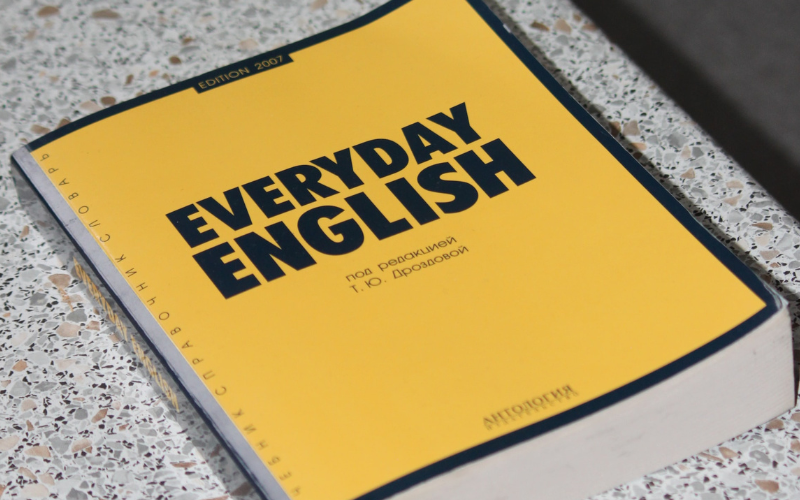Top courses

Basic Spoken English Course

$25 $75
- Speak and understand basic English with confidence.
- Confidently count the numbers.
- Build up your vocabulary.
- Ability to say dates precisely.
- Understand the basic elements of the English language and apply them practically.
- Understand how the basic English grammar works and use it practically and effectively.
Featured courses
Latest blogs

Created by - Skill Space
Oxford Commas and Why are they so important?
Oxford commas have brought heated debates throughout modern English history, yet we have to reach absolution regarding whether the comma is correct. In this article, we are not going to say whether using the comma is right (or are we?). Instead, we're just going to see what the Oxford comma is all about.So, what exactly is the Oxford Comma?Oxford comma, or the serial comma, is a comma used after the second item in a list of three or more, before the word "and" or "or". This comma was first used by Oxford University Press, hence the name.Using the Oxford comma, however, is a matter of subjective preference. It depends on the region as well. For example, American English almost always recommends using it. However, English writing styles in Canada or the UK may advise against it.In my personal opinion, Oxford commas should be used in sentences that may create ambiguity.Let's see where we actually have to use the Oxford comma with some interesting examples.Oxford Comma and the AmbiguityWhat is ambiguity you may ask? Ambiguity represents that a word or a sentence may possess more than one meaning to it. Since the Oxford comma deals with the ambiguity related to the items listed in a series of three or more, let's take two such examples.1. The office hires software engineers, artists, and salesmen.Here, the comma between "artists" and "and salesmen" is the Oxford comma. However, if I remove it from this sentence, the meaning does not change at all. Look!The office hires software engineers, artists and salesmen. Since software engineers and artists are two completely different words, it does not create ambiguity. So, in this case, the Oxford comma is optional or redundant.Let's take another example!2. He gave his speech to the audience, cats, and dogs.You can already see the Oxford comma here, can't you? Good! Now, what if I remove it? The sentence will read like this.He gave his speech to the audience, cats and dogs.The removal of the Oxford comma creates a funny example of our speaker giving a speech solely to cats and dogs. Adding the comma there will separate the audience as its own element, stating the audience may consist of other people along with some cats and dogs.Of course, the sentence itself isn't as clear as the "audience" isn't properly defined. But hey! At least it's not cats and dogs only. See how the meaning changes?Let's see a few more examples where the comma would definitely be necessary to separate three or more items in a series clearly.a. Ms Sarita is working on two projects, designing the brochure, and preparing a speech.b. He went there with his parents, Rahul, and Anuja.Final ThoughtsThe universal agreement on the Oxford comma usage remains to be seen. However, objectively speaking, it is up to you to subjectively use the comma as you see fit. As you have seen above, the comma isn't distinguished and isn't necessary either.So what does that tell us about the Oxford comma? Use it wisely as you see fit in a sentence. If you personally think not using the comma would cause confusion, do use it. However, be aware of which language rules or writing styles you are following. Because as mentioned earlier, some writing style guides strictly forbid the use.However, writing is an individual task and a writing style has its own individuality. So, whether you should use the comma? I'll leave it to your best judgement.If you are looking for some useful courses to up your skills, feel free to browse our website or drop us a message for more information!
More detailsPublished - Mon, 06-Feb-2023

Created by - Skill Space
English grammar for beginners
What is the first thing that pops up in your mind when you talk about the English Language in India? The English Grammar...!English Grammar? What is it?We Indians love technicality when it comes to studying the English language. Past tense, present tense, future tense... Even though you may not be studying English, we guarantee that you must have heard these terms many times before. They are not really unfamiliar to you.But what is Grammar, exactly? Grammar is basically a conventional set of rules to construct and use a language effectively--in a way that would make sense. While grammar is not absolute, it is necessary to understand and speak a language as fluently as a native.So, in this article, we will cover the three basic tenses. Apart from that, you should be aware of the English pronouns to understand the language more effectively.English PronounsWe all are aware of what nouns are, right? Nouns are basically names for things, places, persons, and other living beings (e.g. flower, leg, John, pumpkin, table, furniture, computer). Well, when we are speaking English, if we consecutively use the same nouns in different sentences, it would sound awkward and weird. Hence, we have pronouns to make up for that.What are pronouns? Pronouns are noun substitute that streamlines speaking and understanding a language. There are three categories of pronouns and each category is further divided into two categories.1. First Person Pronounsa) SingularThe first-person singular pronoun is used for referring to yourself. This pronoun is 'I/me'.For example, I am an engineer.Remember, the 'I' is always written in capital letters.b) PluralThe first-person plural pronoun is used for referring to a group of yourselves. This pronoun is 'we/us'.For example, 'We are the future!'2. Second Person PronounsThere is only one second-person pronoun in the English language, which is 'You' or 'Your'. It is used to refer to your direct listener. There is no singular or plural version of the second-person pronoun. However, the word 'you' may be followed by the word 'all', denoting that it is being used in a plural manner. Take a look at these two examples."You are a man.""You all are sailors."3. Third Person Pronounsa) SingularWhen it comes to third-person singular pronouns, we have to consider gender as a factor. Different genders have different pronouns. Take a look at this list below.He - third person singular male pronoun.He is a boy.She - third person singular female pronoun.She is a girl.It - third person singular non-gendered pronoun used for other living beings apart from humans and inanimate objects.It is a box.b) PluralThere's only one third-person plural pronoun in English and it is 'They'. This pronoun is not affected by gender, unlike singular pronouns. Also, this pronoun is not to be mistaken as an honorary pronoun to show respect to elders. There are no honorary pronouns in English.They are playing on the ground.English Grammar TensesEnglish Grammar is, of course, way more than just tenses. However, tenses affect how grammar functions the most. Hence, it is necessary for us to understand how the tenses work on the basic level. Let's see them in more detail.Like most Indian languages, English also has three basic tenses, that are further subdivided into four different categories. These tenses are Past, Present, and Future. Let's see the basic six tenses everyone should know if they are planning to learn the language.a. Simple Present TenseThe simple present tense denotes a simple statement that describes an event of the present. Simple tenses, unlike continuous tenses, are often used to deliver factual information, rather than an action that is happening in the present. The basic sentence structure follows the following formula:S + V1 + Object/ComplementFor example, Aury eats a mango. Here, 'Aury' is the subject; 'eats' is the verb; and 'mango' is the object.>Quick lesson!<S stands for Subject. The subject of the sentence is the one that does the action and is preceded by the verb (unless it is a passive construction—where the subject comes at the end, or does not come at all).V stands for the Verb in a sentence. A verb is basically an action that our subject does. In this formula, the V1 is the present form of the verb.The Object is the part of the sentence upon which the action happens. However, not all sentences have an object. Sometimes, they just bring full meaning to the sentence by providing more information about the subject. In this case, it's called a complement, or more precisely, a subject complement.b. Simple Past TenseSimple past tense talks about an event that has happened in the past. Like simple present tense, simple past tense, too, is used for delivering factual information rather than an event that was happening in the past. Let's see the syntax.Subject + V2 + Object/ComplementHere, V2 stands for the past form of the verb.For example, He was a sailor.Can you identify the subject, verb, and complement in this sentence? (There's no object here).c. Simple Future TenseThe simple future tense talks about things or facts that may occur in the future. That's all there is to it. Let's see the syntax.Subject + will/shall + V1 + Object/ComplementFor example, 'they will take the class.' Here, 'they' is the subject, 'will take' together makes the verb part of the sentence, and 'class' is the object.ConclusionIn this article, we have barely scratched the surface of English grammar basics. However, it is a good start. Understanding pronouns and the nature of tenses is what you need to understand when you begin learning English. Hopefully, this article has piqued your interest in the language. English grammar is simple to understand, yet so irregular.If you are interested in learning the language, we also invite you to take our Basic English Course for an in-depth understanding of English grammar. Please feel free to connect with us for more information!
More detailsPublished - Fri, 03-Feb-2023

Created by - Skill Space
Wordpress hosting options
Having an online presence for small businesses in India is still a fairly new concept. While not many are considering the option, some of them have started realising how important it could be for their business. A part of that realisation is to have a website in India. And to have a website, you need a host. So, how and where can I find WordPress hosting solutions in India? Let's find out!What is WordPress?Right, the WordPress. In layman's terms, WordPress is basically a tool to make your website. And for FREE!! In old days, you would absolutely need a developer to make your website. WordPress sort of eliminates that option.Even if you do not have any technical background, you can still create a basic website with WordPress. It is an EMS tool that gives you all the necessary tools and a thousand of free templates to create a website within just a few hours. Awesome, is it not? WordPress does make it fairly easy to create a website.However, you may still have to hire a developer if you want to create a unique-looking website for your business.What is a WordPress host?Even though you can freely create a website with WordPress at no cost, hosting is a completely different domain. The 'host' is basically a server that keeps your website live on the internet and makes it available to the public. To get a unique website address (domain name) for your website, you will need a host.Technically, do you absolutely need a host? No. You can simply create a website on WordPress and publish it with the ".wordpress.com" domain. However, this does not give your business the unique identity it deserves. Furthermore, it is not optimal for attracting customers or handling heavy-duty traffic on your website.So, while hosting costs, it certainly has some upsides. First and foremost, you can choose a unique domain name that creates a unique identity for your business. Secondly, even though hosting costs, it does not have to be expensive. You can pay less than what you pay for your monthly mobile data pack, and still get a quality host for your website. And third, it can handle heavy-duty traffic loads and ensures that your website stays up all the time.Also, this may be optional, but depending on your hosting package, you may also get a website maintenance service from your host provider.What determines the price of a hosting service in India?When it comes to prices, there are many determiners. While you may find a hosting option as cheap as paying 50-150rs per month, you may have to consider some options first.There are two types of WordPress hosting. One that uses a shared hosting server to host your website. This means your website will be hosted on a server other websites are hosted on. Think of this as renting an apartment with other tenants. The other one is dedicated hosting, where you get to keep the server and its resources for your website only. Of course, this is a relatively more expensive option than shared hosting.Secondly, the operating system. Hosts tend to use Windows or Linux as their operating system. Since Windows is paid software, hosting on a Windows OS server tends to get a bit more expensive. However, many experts in the industry proclaim that using Linux may be more viable for your website than Windows itself as it is open-source, free, and flexible.And third, the hardware itself. The cheaper hosting options will get you less storage space for your website, and less website performance value—which may not be optimal if you wish to publish your website globally. More expensive packages tend to give better storage space and hardware resources allocated for your website.So, it is important to remember these factors before you consider a hosting package.What are the WordPress Hosting Solutions in India?WordPress hosting solutions can cost as little as ₹59 per month. Cheaper than you expected? But, it is also essential to get a quality host for your website, right?1. HostingerHostinger is a Lithuanian-based WordPress hosting solution that is popular in India. They have the best deals for all sorts of website hosting solutions in India, starting as cheap as ₹69. The least you can get from Hostinger is 50GB SSD storage space, a free domain name for 1 year, 100GB bandwidth, 2 databases, and 1 email account—all for one website.For more information, please consider visiting the website linked above.2. BigRockBigRock is an Indian-owned hosting company that provides world-class hosting solutions to Indian websites. With plans as cheap as ₹59/month, BigRock provides quite a lucrative hosting solution. With dedicated and shared hosting options powered by Windows or Linux OS and top-of-the-line hardware resources, your website will run like butter in no time.Find more details regarding their hosting plans on their website.3. BlueHostBlueHost is another well-known hosting solutions brand across the world that is also well-known in India. With their data centres located in India itself, BlueHost actually makes an optimal high-quality hosting solution for Indian websites. With their shared hosting options starting from ₹169/month, BlueHost allocates high-quality hardware resources and technical support for their websites, even for the cheapest plan.For more details, please visit their website.ConclusionThere are a tremendous amount of WordPress hosts in India. In this article, we have chosen the top three options for WordPress hosting solutions in India. This is our personal opinion and has not been affected by any affiliation or sponsorship by any of the hosts mentioned above. We hope that you find this information useful.If you have any other suggestions to make on this article, feel free to connect with us.
More detailsPublished - Fri, 03-Feb-2023

Created by - Skill Space
English Learning For Beginners
English has been a global language for a long while now. You could say that learning English has now become a necessity. With English, you certainly open a whole new world of opportunities. So, should you learn English? Of course, you should. In this article, we will include some English Learning tips that may prove useful for beginners.India and EnglishIndia is one of the countries where English is commonly found and spoken. In fact, did you know that India ranks 2nd in English Speaking Population? Yes, it's true! According to Wikipedia, we have around 125 million (12.5 Crores) English speakers in India. Besides, English is one of the official languages in India.We have our business meetings in English, school and college education in English, and even the day-to-day business is also conducted in English, whether it is in written form or oral form.That being said, you must have learnt basic English in your school life before. Or if you are a school student, you must be learning English. However, not all schools are reliable or efficient when it comes to learning a language as they teach you mainly from an academic point of view. This is also why we seek English courses from English-specialised institutes.Are they really reliable?Yes or no, this opinion completely depends on you. Each English institution has a different approach and while that may prove effective for someone, doesn't mean it would be effective for you too. While we think about this, it's also important to understand your capacity for learning. Not everyone is a fast learner.However, that being said, it does not mean you cannot learn English at all. In fact, learning English or any other new language as a beginner can be scary. However, once you get into it, it's a breeze. So yes, whatever institution you enrol into, just know that your willingness and passion for learning the language are important!Tips for Learning the English Language for Beginners.Before we begin, we just want to clarify that not everyone learns a language the same way. While these tips may prove helpful for others, we do not guarantee that they may prove helpful to you. You and you only bear full responsibility for following these tips. Okay, let's begin!Immersion is the key to learning any language out there. Which means consuming media or books that are in your target language. When you are new to something, one of the best pieces of advice we can give is to observe and imitate. From my personal experience, I can say that it worked miracles for me.a. Read Children's booksNo matter the age, if you are learning a new language, you should always prefer reading children's books. Why? Because they are specifically catered for language learning. These books contain easy-to-follow, simplified language, pictures for immersion, and generalised vocabulary.Adding to this point, you can easily find plenty of children's stories on YouTube easily, like this one. Combining these two methods (reading and listening) can get you immersed in the language rather quickly.b. WriteWriting is another essential part if you want to get used to a language quicker. Writing helps reinforce your knowledge of a language. For example, if you were to learn the letter A by eyes only, you might not be able to remember it as quickly as you would via the writing method.Apart from that, we also encourage you to write down sentences or small, simple English essays to utilise your English knowledge practically. Practical use of the language is the key to learning a language effectively.c. ConversationsAs mentioned previously, using a language via practical means is your way to learning it well. And what else screams 'practicality' better than using the language in real-time situations? And this part is possibly the most difficult for a lot of learners. The reason is mainly the anxiety of speaking in another language and lack of confidence in your own language ability.However, a good environment or a good teacher will always encourage you to speak out, no matter the mistakes. Mistakes are how you learn the language.d. Take it easy!Learning a language is a process and hence we believe that it should be followed thoroughly and systematically. However, it is also okay to wander off the path and learn English in your own way sometimes, as long as you are confident it's working out for you.And as it is a process, it's possible you will face difficulties, and some of them would be too hard for you to overcome instantly. However, patience. You are going to do fine. Just don't lose your determination, okay?Bottom Line and OpinionAs a beginner, learning English can feel like a breeze and as you go to advanced levels, it can get confusing. However, a language learning experience is a pretty fun one. Don't worry too much about you needing a language to fulfil the criteria for a job or whatever.HAVE FUN! It is really an enjoyable experience if you allow it. Learn it as a hobby and watch your language grow, even without your realisation. That's all the advice we have as we conclude this article.
More detailsPublished - Thu, 17-Nov-2022

Join Skill Space & explore professional courses!
- Thoroughly thought-out courses that will add value to your knowledge.
- Live interactive sessions and text-based support via Skill Space's message system at no extra costs.
- Course availability in Indian languages: Marathi and Hindi, making learning fun and easy.
Write a public review